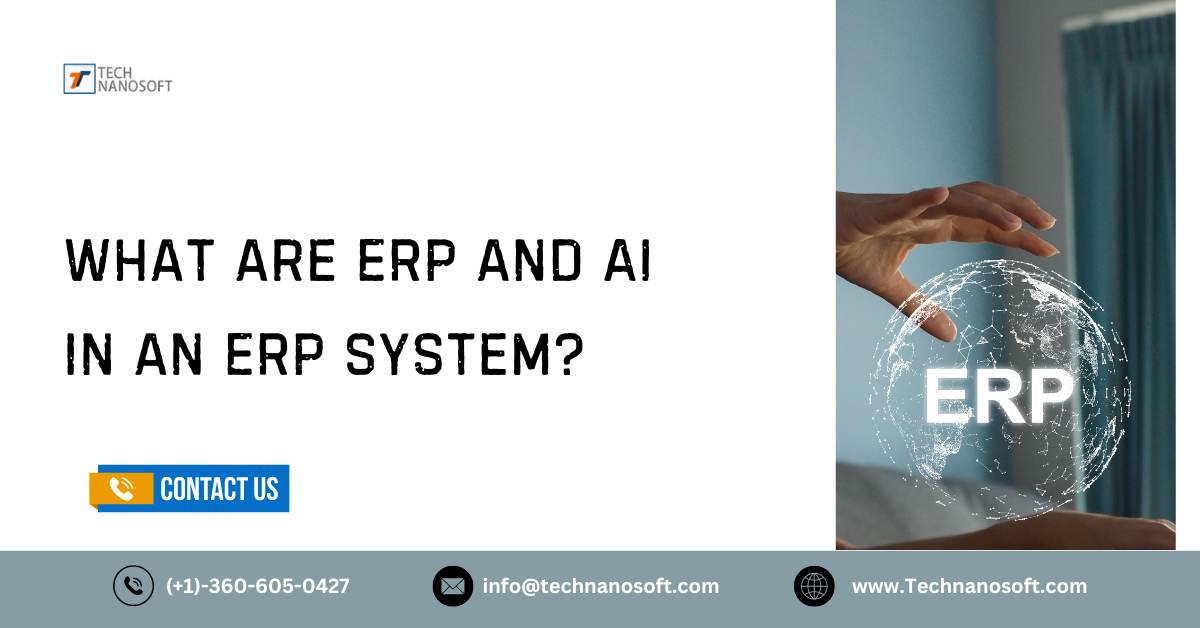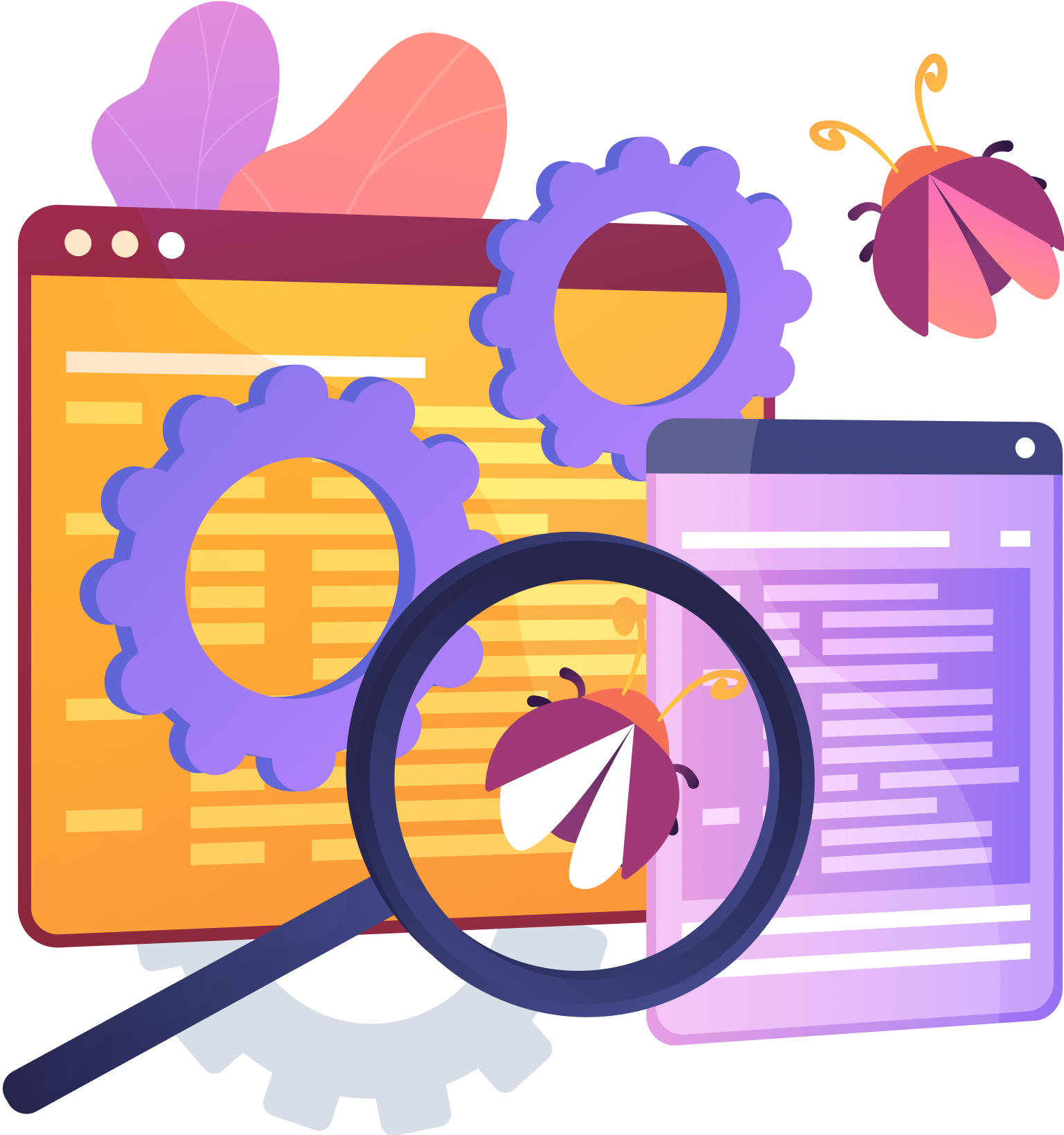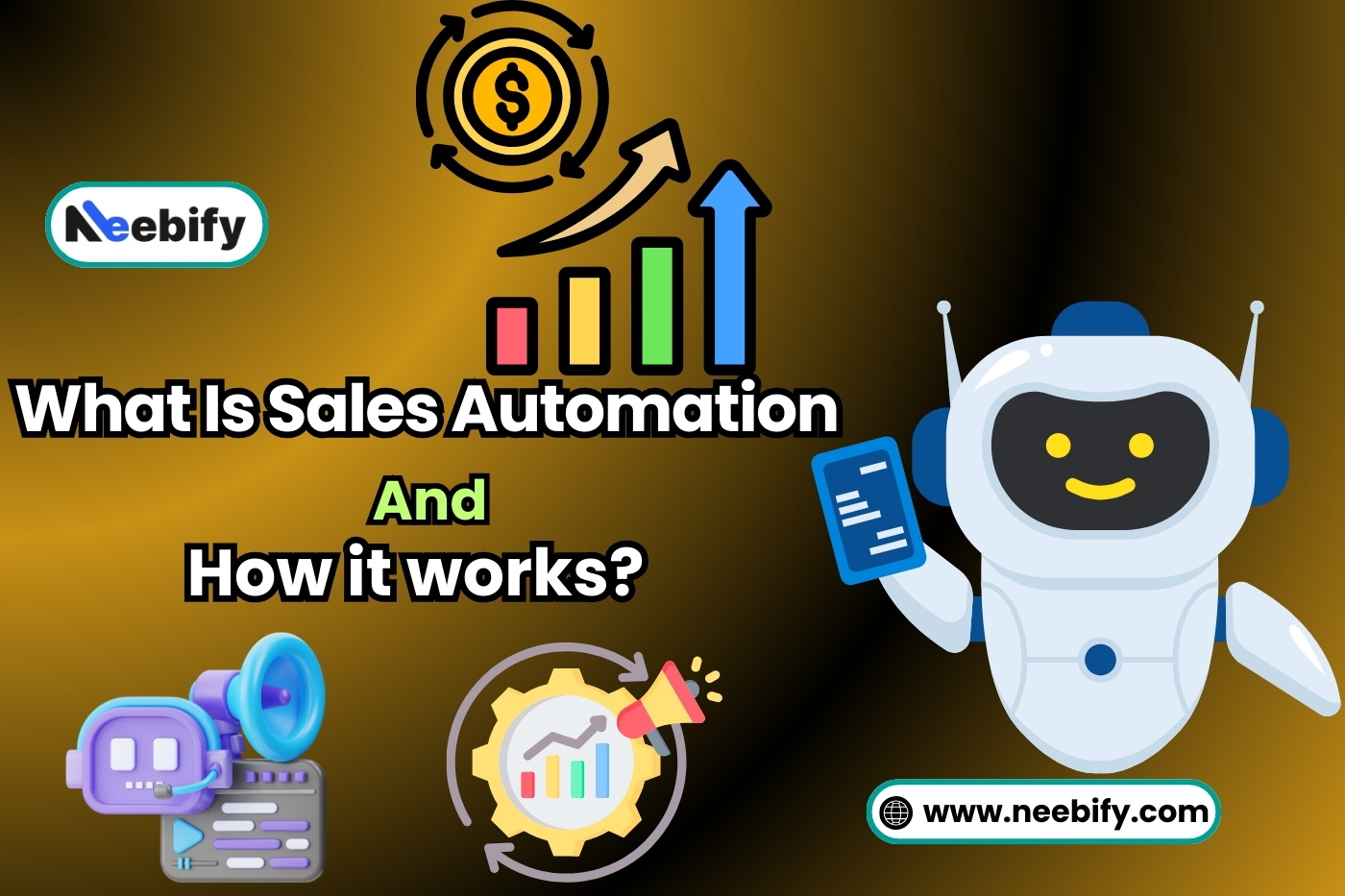What are ERP and AI in an ERP System?

It's important for businesses to use technology that works well with other things in order to be successful." Web systems and ERP (Enterprise Resource Planning) systems are the two most important parts of this integration mix. This comprehensive guide delves into the application of artificial intelligence (AI) to enhance the power of ERP systems.
We'll talk about the basic ideas behind ERP systems, how AI is changing the way ERP systems work, and why companies in all kinds of fields are using this combination to achieve long-term growth and project success. Come with us as we explore how ERP and AI are changing the business world. Learn about the strategic advantages they provide. Join us on this journey of discovery.
What Does ERP Mean?
Enterprise Resource Planning, or ERP is a complete piece of software that brings together important business tasks and Automated Processes into a single system. It helps businesses run more efficiently by automating chores in areas like finance, HR, supply chain management, and more. ERP systems have a central database that helps teams share data easily. This allows them to work together and make decisions quickly."
ERP makes things more efficient, cuts down on mistakes made by hand, and raises total productivity by standardizing processes and workflows. ERP can help businesses of all kinds make the best use of their resources, keep up with changing markets, and make customers happier.
Artificial Intelligence in ERP Systems
AI is the pinnacle of technological progress. it makes machines smart like humans. Traditional enterprise resource planning (ERP) tools have undergone significant changes because of AI's disruptive effects on business. Unlike conventional systems, ERP that uses AI becomes a self-aware, adaptable being that can learn and make decisions on its own.
This mimicking of how humans think allows AI-powered ERP to look at big datasets, find trends, and make operations better. When AI and ERP work together, they create a new era of efficiency where companies use smart automation to handle complexity and make strategic choices based on data.
Why is ERP Important For Business?
Streamlined Operations
ERP is important for businesses because it combines important tasks like accounting, human resources, manufacturing erp, and more into a single system. This makes things run more smoothly by cutting down on manual work, getting rid of data silos, and making sure that all areas are using the same information. ERP automates routine Automated Processes, freeing up workers' time to work on strategic tasks and new ideas. This increases efficiency and productivity across the board.
Data-Driven Decision Making
One of the best things about ERP is that it can give everyone in the company correct, real-time data insights. By combining data from different areas, ERP allows you to make smart decisions based on up-to-date data. This gives companies a competitive edge by helping them spot trends, predict demand, make the best use of their resources, and quickly adapt to changes in the market.
Improved Collaboration
ERP makes it easier for teams and departments to talk to each other, which encourages cooperation. When all employees have access to the same centralized data, they can collaborate on projects, streamline workflows, and easily share information. This fosters teamwork across functions, makes things clearer, and makes sure that everyone is working toward the same business goals, which leads to better results and happy customers.
Enhanced Scalability
ERP systems can grow with a business, accommodating more people, data, and operational complexity. This ability to grow or shrink is important for responding to changes in the market, entering new areas, adding new products, or buying or selling business units. ERP's adaptable structure allows you to change things and connect them to other programs, so it can adapt to changing business needs without causing problems or waste.
Regulatory Compliance
Businesses must follow industry rules and laws at all times, especially in areas with a lot of rules, like healthcare, finance, and manufacturing erp. ERP systems have controls, audit trails, and reporting features.
These features help businesses follow the law, protect data, and show honesty during checks or audits. As a result, the risk of fines or non-compliance is reduced. This reduces the risk of fines or non-compliance.
Client Satisfaction
ERP ultimately enhances customer satisfaction by simplifying processes, improving the quality of goods and services, and ensuring prompt responses to questions or orders. ERP systems with CRM capabilities allow for personalized interactions, faster order processing, and improved customer service. This helps build trust, increase customer loyalty, and generate positive referrals through word-of-mouth. This fosters trust, promotes customer loyalty, and generates positive word-of-mouth referrals.
What Business Functions can be Optimized with ERP?
Commerce Optimization with ERP
ERP systems make business better by combining customer data, e-commerce sites, and sales processes. They make it easier to handle orders, keep track of inventory, and communicate with customers, all of which make shopping easier.
Online stores and ERP systems update information immediately. This ensures that inventory levels are accurate. It also ensures that orders are filled promptly. Additionally, it ensures that customers receive personalized service.
ERP has analytics tools that help you look at things like sales trends, customer behavior, and market demand. This enables you to come up with more focused marketing plans and products that will keep your business growing and your customers happy.
Human Resources Enhancement with ERP
ERP transforms HR management by centralizing all employee information, including salary, benefits administration, and performance tracking. It automates common HR jobs like keeping track of attendance, managing leaves, and reporting on compliance, which cuts down on paperwork and mistakes. Self-service portals in ERP give workers access to personal information, training materials, and HR policies. This makes them more engaged and productive.
ERP HR analytics provide information about how well employees are doing, where skills are lacking, and how to plan for the next generation of leaders. This helps organizations make smart talent management decisions that are in line with their goals and the best practices in their field.
ERP Financial systems
ERP financial systems help manage money better by putting budgeting, accounting, billing, and reporting all in one place. It simplifies financial tasks such as paying and receiving money, doing the books, and ensuring taxes are paid correctly. This reduces the number of errors and processing times that occur by hand. Real-time financial insights from ERP help with accurate forecasting, managing cash flow, and evaluating risk, which in turn helps people make smart financial choices.
ERP's audit records and compliance tools ensure adherence to rules, data security, and transparency for all stakeholders. ERP simplifies financial tasks, enhancing resource utilization, cost management, and revenue generation, enabling businesses to expand and maintain their competitiveness.
Supply Chain Optimization with ERP
ERP enhances supply chain management by combining logistics, purchasing, inventory control, and vendor relationships. You can view the entire supply chain, from the origin of raw materials to the delivery of finished goods. This makes it easier to plan your inventory and predict demand. ERP automates tasks like placing buy orders, restocking, and tracking shipments, which cuts down on lead times and the cost of keeping inventory on hand.
Collaboration tools in ERP make it easier to talk to sellers, which speeds up the buying process and makes sure that products meet quality and safety standards. Enterprise Resource Planning (ERP) helps the supply chain become more flexible. This allows it to respond quickly to market changes. ERP also improves operational efficiency by using real-time data analytics.
Manufacturing Excellence with ERP
ERP changes the way factories work by making planning, scheduling, quality control, and maintenance tasks more efficient. It uses data from the shop floor, machine monitoring, and inventory levels to enhance production processes and reduce downtime. ERP's Material Requirements Planning (MRP) ensures efficient resource use, inventory optimization, and cost-effective production methods.
ERP's quality management modules keep track of inspections, corrective actions, and product quality standards to make sure that the company is following industry rules and meeting customer demands. ERP improves industrial efficiency, creates new products, and makes customers happy by coordinating production with predicted demand and real-time data analysis.
The Advantages of AI Chatbots in ERP
Instant Responses
Traditional customer service methods often have slow response times, which can slow down work and make customers angry. AI robots, on the other hand, can answer questions right away. These chatbots use machine learning techniques to understand and answer user questions quickly.
By quickly solving problems, AI chatbots keep business operations running smoothly and raise customer happiness overall. This immediate availability and responsiveness make the customer experience much smoother, which boosts company loyalty and perception.
Personalized Interactions
AI-powered chatbots learn from users' habits, tastes, and past actions. Chat bots use complex algorithms to look at user data and respond in a way that is relevant to each person. Because of this, chatbots can change their responses, suggest related goods or services, and make personalized suggestions based on each user's profile.
AI chatbots improve user engagement with the ERP system. This leads to higher satisfaction and stronger relationships with customers and employees. The interactions are personalized. Personalization in competitive markets can greatly impact user retention and loyalty.
Efficient Task Execution
Adding AI chatbots to ERP systems makes it easier for many business departments to complete tasks quickly. Chatbots can do many tasks well. They can find data, update records, start routine tasks, and make reports. AI robots automate these tasks so that people don't have to do them over and over again.
This cuts down on mistakes and ensures consistency. This automation not only makes operations more efficient but also frees up employees to work on more important tasks like analyzing data, making decisions, and coming up with new ideas, which helps the business grow as a whole.
Reduced Workload on Human Resources
AI chatbots are great at doing boring, repetitive jobs that humans might find time-consuming. It is easy for AI chatbots to handle common tasks like answering questions, handling standard requests, data entry, and making meetings. By taking these jobs off of human resources, chat ai
help employees have less work to do and feel less stressed. This lets human workers focus their time and skills on jobs that require them to think critically, solve problems, be creative, and get along with others. In this way, companies can make the best use of their resources, boost output, and create a happier workplace for their employees.
Natural Language Processing (NLP)
Natural Language Processing (NLP) is a branch of artificial intelligence (AI) that focuses on using natural language to make it easier for computers and people to talk to each other. In the world of enterprise resource planning (ERP), Natural Language Processing (NLP) is a powerful tool. It enables users to interact with the system in a more natural and intuitive manner.
NLP helps ERP systems understand what users are saying by reading and understanding the details of human language and turning them into useful information. Using NLP makes interfaces easier to use and improves the user experience. This changes how people connect with and get useful information from ERP solutions.
READ ALSO- How To Make an AI Apps Like FaceApp? How it Work?
ERP Project Success Factors Include
Understanding Business Requirements
To successfully add AI to ERP, you must first have a deep knowledge of what the business needs. Examining their working problems, goals, and methods is crucial for businesses. This step ensures the strategic use of AI technology to address specific business challenges, enhance operational efficiency, and foster innovative ideas within the ERP framework.
Businesses can get the most out of AI-enhanced ERP systems by making sure that their skills match their specific needs. This gives them a competitive edge and helps them grow in a way that lasts.
Intelligent Data Management Techniques
Effective use of AI in ERP heavily depends on Intelligent data management. For getting useful insights and making sure systems work at their best, data accuracy, safety, and security are very important. We take strict measures to protect private data in the ERP-AI ecosystem. These measures include data governance, quality checks, encryption, and access controls.
By keeping data accurate and reliable, companies can utilize AI programs to analyze large data sets. The AI programs can then identify valuable insights and help businesses make informed decisions. This ultimately leads to business growth and the generation of innovative ideas.
Employee Training
The human factor is very important for getting the most out of AI-enhanced ERP systems. Employees need thorough training programs. This will help them successfully use AI technology in an ERP system. Giving employees proper training is important.
It ensures they can effectively utilize AI technology. Users should learn about AI features, system functions, data interpretation tools, and the best ways to use AI-driven insights in their daily work during training lessons.
Given the appropriate training and tools, employees can utilize AI to enhance their work, make informed decisions, and collaborate effectively, resulting in tangible business outcomes and improved overall operational efficiency.
Ongoing System Maintenance
The ERP-AI ecosystem needs to stay current with changing business needs, safety standards, and government regulations. To do this, it is important to regularly update, fix bugs, apply security patches, and optimize the system.
Regular maintenance plans, data backups, emergency recovery plans, and performance tuning steps can help reduce risks and minimize downtime. These measures also safeguard system integrity. This lets AI-enabled ERP platforms keep running smoothly and making money.
Alignment with Business Goals
The final success of an AI-infused ERP project depends on how well it fits in with the company's overall goals and plans. Everything about integrating AI, managing data, teaching employees, and keeping the system running should directly help the company reach its goals, become more competitive, and grow.
Well-aligned business plans and technology implementations foster a mutually beneficial relationship. This is where AI-driven insights, operational efficiencies, and well-informed decision-making all work together to help the company become successful and market-leading.
Conclusion
ERP systems have added AI. This change is leading to increased efficiency, innovation, and strategic advantage for businesses in different industries. By harnessing the power of AI-driven insights, organizations can streamline operations, optimize resource utilization, and make data-driven decisions with precision.
ERP systems and AI collaborate to boost productivity and agility, helping businesses gain a competitive edge in today's fast-paced market. In today's digital age, businesses must embrace AI in ERP to ensure sustained growth, customer satisfaction, and project success. It is no longer just an option, but a strategic imperative for evolving companies.
FAQs For ERP AI Chatbot
Q.1- How does an AI chatbot increase user interactions in ERP systems?
A- Chat bots working with ERP systems help users by providing real-time assistance, quickly retrieving data, and offering personalized answers. This makes the user experience better, which makes everyone in the ERP system happier and more productive.
Q.2- Is it possible to customize an ERP AI chatbot to meet specific company requirements?
A- Indeed, the flexibility of an ERP AI chatbot enables it to cater to the diverse needs of various businesses. The chatbot can do many different business tasks, like answering industry-specific questions, automating workflows, and having special interactions."
Q.3- What safeguards are in place for ERP AI chatbots?
A- Safety is the most important thing. There are strong security measures that ERP AI chatbots use to keep private data safe. These include encryption protocols and authentication methods. By following the rules of your business, you can have peace of mind knowing that your data is secure and private.
Q.4- How does the AI-driven chatbot improve the overall performance of the ERP system?
A- The AI Chatbot helps the ERP system by managing data entry, inventory, and supply chain tasks more efficiently. This reduces human involvement while also improving accuracy, allowing businesses to work more efficiently and quickly.
Q.5- Does an ERP AI chatbot require continuing care and maintenance?
A- There is a need for ongoing support and maintenance. The ERP AI Chatbot gets regular updates and improvements to keep up with changing business needs and new technology." By doing this, the chatbot will continue to work, and its skills will keep getting better over time.









